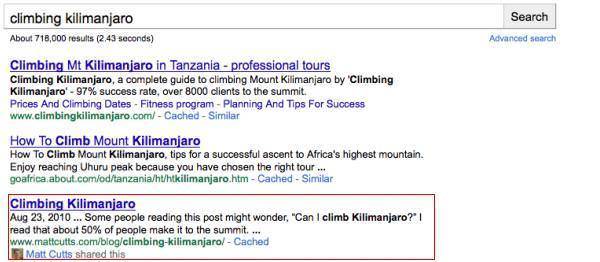
Ever since last summer, the Internet has been awash in rumors of a Google social network. First, it was “Google Me” and later it was “Google +1”. Last September, however, Google CEO Eric Schmidt explained that the company wasn’t working on a stand-alone social network, but rather the interweaving of social elements. “”We’re trying to take Google’s core products and add a social component,” said Schmidt.
Today, Google is doing just that. The company is updating its Social Search feature, which it first launched in 2009, and bringing a tighter, deeper integration of social connections to Google Search.
We got a chance to chat with Mike Cassidy, Product Management Director for Search at Google, about the new product and he told us that today’s announcement comes in three distinct parts. First, social search results will no long sit idly by at the bottom of your search screen. Instead, they’ll be interwoven with other results and identified as social results. Second, these results will be pulled from a greater variety of sources, from social networks to blogs and shared content. Third, users will be given a greater level of control over what sites they link with their Google profile and whether or not they’re publically displayed on their page.
Let’s take a look at what these integrations will look like. First, there’s the blending of social search results.

As you can see, the blog by Google’s Matt Cutts is amidst other search results, rather than quarantined at the bottom of the page. It’s a blog post that Cutts posted on his personal blog, which he links to on his Google profile. Next, you can see that search results will contain content that’s shared, not created, by members of our social circle.

“Currently, Google social search is based on content your friends create,” said Cassidy. “We’re expanding that to content your friends share.”
Next, we have the updated control over what you share and display on your Google profile.

As you can see, Google may find accounts of yours from around the Internet and suggest that you connect them. If you don’t want to, however, you can make sure that the account is not publically connected.
So, Is This Part of ‘Google Me’?
If the so-called “Google Me” is simply a social layer, then we’d have to say that this qualifies. Search Engine Land had an article this week about a report that found that Google Search personalization wasn’t arriving at the expected results. That is, Google’s personalized search wasn’t acting based solely on previous search history and interests, it wasn’t “subtle” as the company has promised, and it wasn’t surfacing the long-tail results one might expect.
This, however, is personalization taken to another level. This is personalization in the form of looking at who you know, who you’re connected to on various social networks, and ranking content according to who created it and who shared it. We were told that Google will even go a step further and look at content shared by friends of friends.
“All the content in Social Search comes from publicly available websites,” explained a Google spokesperson. “For example, you can find content from a friend if that friend has created a Google profile and chosen to link publicly to other websites, such as Twitter or Flickr. You can also find content from public Picasa Web albums, public Buzz posts, and your own Reader feeds.”
Your friends don’t have to even have a Google profile for their content to show up in your search. If you’re friends with them on Twitter and you connect your Twitter account, you can see what they share on Twitter in your search results.
Beyond the increased depth of these social results and how they’re displayed, there’s actually not much here that Google is doing any different than it has for the past two years. But it doesn’t take much for a company like Google to have a big effect.
As Cassidy pointed out to us at the end of our conversation, Google’s mission is “to organize the world’s information and make it universally accessible and useful.” A move to create another, stand-alone social network would seem like folly to some, especially with the company’s track record when it comes to social. This move, on the other hand, feels just right. Gather the information and use it as yet another signal on what is relevant to your search.

















